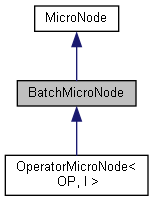BatchMicroNode is the base class for custom micro nodes which shall receive a batch of input values in their Process method and compute the corresponding output values. You should prefer this over a BasicMicroNode when the Process method consists of just a few simple operations: Then the calling overhead of nodes is significant, and it can be reduced when a single call to Process handles a whole batch of values. Of course this only holds when there is a proper batch of values, for example in the context of shading there's usually just one set of values.
To implement a BatchMicroNode, you have to derive a new class from BatchMicroNode and add a function template
// This class defines a micro node group which adds batches of two Int values by a BatchMicroNode.
class MyBatchAddNode
{
public:
// Declaration of the input and output ports of the micro node group.
MAXON_PORT_INPUT(Int, in1);
MAXON_PORT_INPUT(Int, in2);
MAXON_PORT_OUTPUT(Int, out);
// Implementation of the single custom micro node.
class Impl : public BatchMicroNode
{
public:
// The Process method needs to specify which ports of the group the micro node accesses, in this case all ports.
// If the group contains more than one micro node, each micro node usually needs only a subset of the ports.
//
// The PORTMODE template parameter allows to instantiate the Process method with different port modes, see PortMode.
//
// Note that there's no const in front of Batch!
Result<void> Process(Batch<in1, in2, out>& batch) const
{
// Iterate over the batch. Again there's no const in front of auto.
for (auto& ports : batch)
{
// Do the computation for a single set of values.
ports.out.Update(ports.in1() + ports.in2());
}
return OK;
}
};
// The Init function will be called to set up the micro node group
// when you call CreateNode<MyBatchAddNode>() or as part of the MAXON_CORENODE_REGISTER macro.
static Result<void> Init(const MicroNodeGroupRef& group)
{
iferr_scope;
group.AddChild<Impl>() iferr_return;
return OK;
}
};
There is the helper class OperatorNode to simplify the implementation of a core node class consisting of a single BatchMicroNode. If you want to implement a core node class consisting of a single BatchMicroNode which just invokes an existing C++ function or operator (as in the example with the + operator) you can also use one of the macros MAXON_CORENODE_FUNCTION, MAXON_CORENODE_OPERATOR_UNARY and MAXON_CORENODE_OPERATOR_BINARY.
|
| using | MicroNodeClass = BatchMicroNode |
| |
| template<typename... PORTS> |
| using | Batch = PortsAccess< PORTSACCESS_FLAGS::BATCH, PORTS... > |
| |
| using | ProcessFn = Result< void >(*)(const MicroNode *, const void *,) |
| |
| enum class | TYPE {
INVALID
,
BASIC
,
BATCH
,
SPLIT_MERGE
,
ITERATION
,
SEQUENCING
,
RECURSION_STEP
,
CURRENT_ITERATION_VALUE
,
CURRENT_ITERATION_VALUE_WITH_INIT
,
COPY
,
SET_TRUE
,
NOP
,
SUBTRACTIVE_DOMAIN
,
JOIN
,
CONTROL_TRANSFER
,
MAX_WITHOUT_FLAG
,
VARIABLE_MASK
,
MIN_FLAG
,
VALUE_PORT_MASK
,
INPUT_PORT_MASK
,
EXPORTED_PORT
,
VIRTUAL_INPUT_PORT
,
OUTPUT_PORT_MASK
,
VARIABLE
,
PORT_MASK
,
FACTOR_MASK
,
ROOT
,
WHILE_CONDITION
,
INDEFINITE_LOOP
,
BLOCK
,
TOP_LEVEL_FACTOR_MASK
,
FRAME_MASK
,
TOP_LEVEL_FRAME
,
FRAME
,
EVENT_MASK
,
EVENT
,
FACTOR_HEAD_MASK
,
BLOCK_HEAD
,
CONDITIONAL_HEAD
,
RECURSION_HEAD
,
DEFINITE_FACTOR_HEAD_MASK
,
CONTAINER_LOOP_HEAD_MASK
,
CONTAINER_OUTPUT_HEAD_MASK
,
DEFINITE_FACTOR_MASK
,
CONTAINER_OUTPUT_ELEMENT_MASK
,
INDEXABLE_FACTOR_MASK
,
DIMENSIONAL_FACTOR_TEST
,
CONTAINER_LOOP_MASK
,
DEFINITE_LOOP_HEAD
,
CONTAINER_LOOP_HEAD
,
ARRAY_LOOP_HEAD
,
CONTAINER_LOOP
,
ARRAY_LOOP
,
CONTAINER_OUTPUT_HEAD
,
CONTAINER_OUTPUT_ELEMENT
,
ARRAY_OUTPUT_ELEMENT
,
DEFINITE_LOOP
,
GENERIC_DEFINITE_LOOP
,
RECURSION
,
INPUT_ELEMENT_MASK
,
ARRAY_INPUT_ELEMENT
,
CONTAINER_INPUT_ELEMENT
,
INPUT_MASK
,
OUTPUT_MASK
,
CONDITIONAL_MASK
,
IF
,
CONTAINER_MASK
,
CONTAINER
,
ARRAY_CONTAINER
,
ARRAY
,
CONTAINER_OUTPUT_MASK
,
CONTAINER_OUTPUT
,
CONTAINER_INPUT_GROUP_MASK
,
CONTAINER_INPUT_GROUP
,
FACTOR_WITH_FACTOR_VARIABLE
,
ALL
} |
| |
| enum class | FLAGS : Int64 {
NONE
,
STATE
,
STATE_MODIFIER
,
LOCAL
,
PERMANENT
,
CACHED
,
CURRENT_ITV
,
NEXT_ITV
,
CONTAINER_MEMBER
,
COMMUTATIVE
,
STATE_MAPPER
,
PARAMETER
,
INPUT_WITHOUT_VALUE
,
OUTER_DOMAIN
,
SUSPEND
,
INDEPENDENT
,
INCLUDE_IN_PREDECESSORS
,
FACTOR_REFERENCE
,
OPTIONAL_INPUT
,
CURRENT_ITV_GROUP
,
NEXT_ITV_GROUP
,
NEW_UNIQUE_NAME
,
TIME_LOOP
,
UNDERSCORE_NUMBER_PREFIX
,
WRAPPER_DONT_WRAP
,
WRAPPER_HIDDEN
,
WRAPPER_KEEP_LETTER_CASE
,
WRAPPER_LAMBDA
,
WRAPPER_USE_ATTRIBUTE_RESOURCES
,
WRAPPER_FIXED_VARIADIC
,
WRAPPER_COPIED_VARIADIC
,
WRAPPER_INNER_DOMAIN
,
WRAPPER_OUTER_DOMAIN
,
WRAPPER_ENCLOSING_DOMAIN
,
WRAPPER_STREAM
,
WRAPPER_CONTEXT
,
NO_LIFETIME_PORT
,
NO_FACTOR_NODES
,
WRAPPER_FLAGS
,
ITV_MASK
,
ITV_GROUP_MASK
,
PORT_MODIFIERS
,
MODIFIERS
,
PORTINFO_FLAGS
,
ALL
} |
| |
| enum class | PORTSACCESS_FLAGS {
NONE
,
ITERATION
,
CONTAINER_MASK
,
CONST_MASK
,
BATCH
,
BATCH_ACCESS
,
CONTAINER
,
CONST_CONTAINER
,
DIRECT_ACCESS_TEST
} |
| |
| template<typename PORT > |
| using | Input = typename PORT::PrivateInput |
| |
| template<typename... PORTS> |
| using | Ports = typename PortsAccess< PORTSACCESS_FLAGS::NONE, PORTS... >::Members |
| |

 Public Member Functions inherited from MicroNode
Public Member Functions inherited from MicroNode Public Attributes inherited from MicroNode
Public Attributes inherited from MicroNode Static Public Attributes inherited from MicroNode
Static Public Attributes inherited from MicroNode Static Public Member Functions inherited from MicroNode
Static Public Member Functions inherited from MicroNode